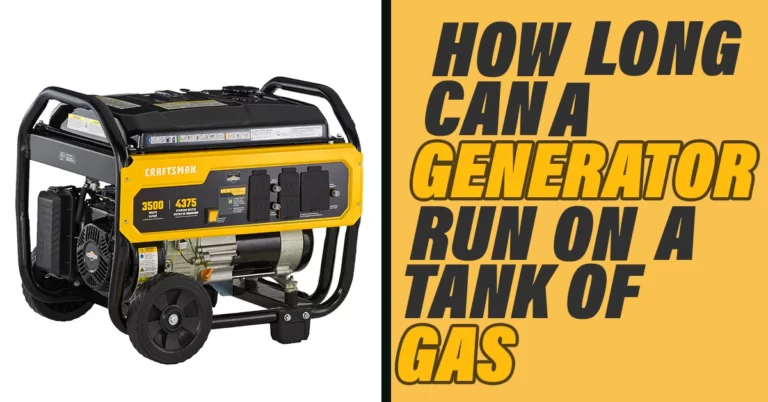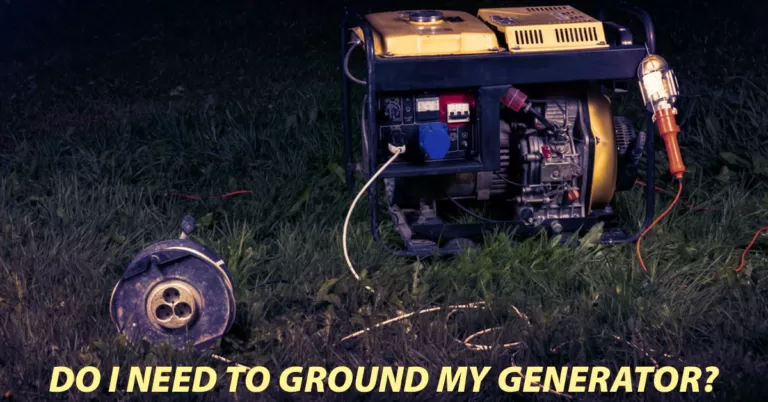Generator Maintenance Schedule: What To Do And When
A gas or diesel generator can be a lifesaver during a power outage or in remote areas without access to electricity. However, owning a generator requires more than just turning it on and expecting it to work flawlessly every time. With regular maintenance, generators can become reliable and even break down completely.
Establish a maintenance schedule that includes weekly, monthly, and annual checks to keep your generator in good working order. A generator maintenance checklist can help you prioritize which parts to check and when ensuring your generator stays in top condition.
The lifespan of your generator can be significantly increased with routine maintenance. Depending on utilization, a backup generator system can last 10 years or longer with preventive upkeep. Maintenance issues brought on by neglect can result in failures and eventually lead to the generator’s destruction.
Like a car that needs to be driven regularly to stay in good condition, a generator needs to be run regularly to maintain its functionality. By keeping up with regular maintenance tasks, you can keep your generator running smoothly and be confident it will work when needed.
Generator Maintenance Schedule Checklist
Daily maintenance Generator Maintenance
Regular generator repair is essential to ensuring that it performs dependably and effectively when you need it most. Daily maintenance chores are especially crucial because they aid in identifying possible issues before they grow into more significant issues. The routine repair procedures that every generator owner should carry out are covered in this piece.
Visual Inspection
The first step in daily maintenance is to inspect the generator visually. Check for any signs of damage, such as cracks or leaks, and ensure all the components are securely in place. Look for any debris or dirt that may have accumulated on the generator, and clean it off with a soft brush or cloth.
Fuel Level Check
Next, check the fuel level of the generator. Running a generator on an empty tank can damage the engine, so it’s essential to ensure that there is always enough fuel. If the fuel level is low, fill it up to the recommended level.
Oil Level Check
The amount of oil should also be checked as part of everyday maintenance. Running a generator with insufficient lubrication can seriously harm the motor. Using the dipstick, check the oil level. If it is low, apply more oil until it is at the suggested level.
Battery Check
Lastly, examine the generator’s charge. Make sure the battery connections are corrosion-free and spotless. Using a multimeter, check the battery power; if it’s low, replenish the battery or, if required, replace it.
Weekly Generator maintenance
Maintaining your generator every week is essential for its best performance. A weekly repair plan helps ensure all parts are in good working order and can avert expensive failures. We’ll review the weekly generator repair procedures in this piece, which every owner should do.
Load Testing
Load testing is an essential weekly maintenance task that checks the generator’s ability to handle the maximum load. It involves connecting the generator to a load bank and monitoring its performance. Load testing helps identify any issues with the generator’s electrical and mechanical components and ensures it can handle the maximum load.
Engine Coolant Level Check
Checking the engine coolant level is another critical weekly maintenance task. Low coolant levels can cause the generator to overheat, damaging the engine. Check the coolant level using the coolant level indicator, and if it’s low, add more coolant until it reaches the recommended level.
Air Cleaner Element Check
The air cleaner portion should be checked weekly as part of routine maintenance. Before the air reaches the motor, the air cleaner part filters out dust and other debris. Engine efficiency can be affected, and early engine damage can result from a clogged air cleaner part. Check the air cleaner element; if it’s dirty, clean it or replace it as required.
Monthly Generator Maintenance
Monthly generator maintenance is crucial to keeping your generator running smoothly and efficiently. A monthly maintenance schedule ensures that all components are in good working order and can prevent costly breakdowns. we’ll cover the monthly generator maintenance tasks that every owner should perform.
Engine Oil and Filter Change
Changing the engine oil and filter is a critical monthly maintenance task. Over time, engine oil can become contaminated with dirt and debris, leading to engine wear and damage. Changing the oil and filter ensures the engine is properly lubricated and protected. Follow the manufacturer’s recommendations for the type of oil and filter and how often to change them.
Fuel Filter Replacement
Replacing the fuel filter is another essential monthly maintenance task. The fuel filter removes dirt and debris from the fuel before it enters the engine. A clogged fuel filter can reduce engine performance and lead to premature engine wear. Replace the fuel filter according to the manufacturer’s recommendations.
Battery Cleaning and Inspection
Cleaning and inspecting the battery is another critical monthly maintenance task. The battery terminals can become corroded over time, affecting the battery’s performance. Clean the terminals with a wire brush and baking soda, and water. Check the battery voltage using a multimeter, and if it’s low, recharge the battery or replace it if necessary.
Quarterly Generator maintenance
Maintaining your generator in top shape requires quarterly maintenance. A yearly repair plan can help you avoid expensive failures by ensuring all parts are in excellent working order. The quarterly generator repair duties that every owner should complete are covered in this piece.
Spark Plug Replacement
Spark plug replacement is a crucial quarterly repair job. A worn spark plug can cause the engine to malfunction or not start because it is the spark plug that fires the gasoline in the engine. By the manufacturer’s instructions, replace the spark plug.
Cooling System Inspection
Another essential quarterly repair job is the inspection of the cooling system. The cooling system controls the engine’s temperature, which also keeps it from burning. Inspect the radiator, cables, and clamps for leakage or damage. Ensure the refrigerant amount is as advised, and add more if required.
Governor Inspection
Another important job for periodic maintenance is to inspect the governor. The governor controls the motor pace and maintains a constant rate. Inspect by inspecting the governor’s linkage is set correctly and clear of debris or obstacles.
Annual Generator maintenance
Maintaining your generator in top shape requires a yearly maintenance plan. While it is essential to perform maintenance duties on a daily, weekly, and monthly basis, a yearly maintenance plan enables you to carry out more thorough inspections and services. This piece will review some crucial yearly maintenance procedures every generator user should complete.
Major Engine Service
A significant engine service is necessary to ensure your generator’s engine is in optimal condition. This service typically includes an oil change, oil filter replacement, and thoroughly inspecting of the engine’s components. Follow the manufacturer’s recommendations for the oil type and how often to change it. Consider having a professional perform a compression test on the engine to detect potential issues early.
Alternator Inspection
The alternator is a critical component of your generator, and an annual inspection is necessary to ensure its proper function. Check the alternator for any signs of wear or damage, and ensure that the brushes and slip rings are in good condition. Also, have the alternator output tested to ensure it produces the correct amount of power.
Control Panel Inspection
The control panel is the nerve center of your generator, and an annual inspection is necessary to ensure it’s functioning correctly. Check the control panel for any signs of wear or damage, and ensure that all controls and indicators are working correctly. You can also test the automatic transfer switch to ensure it appropriately transfers power during an outage.
Electrical System Check
A yearly inspection is required to verify the correct operation of a generator’s electrical system. Verify that the generator’s output power and cadence match the specifications set by the maker. It would also help to stress test it to ensure the generator can produce the required amount of electricity.
FAQs
-
Why is it important to conduct regular maintenance on my generator?
Regular maintenance helps prevent breakdowns, prolongs the life of your generator, and ensures that it is ready to use when you need it most.
-
What should I check during my daily generator maintenance?
During your daily generator maintenance, you should perform a visual inspection, check the fuel and oil levels, and inspect the battery.
-
What should I check during my weekly generator maintenance?
During your weekly generator maintenance, you should load test the generator, check the engine coolant level, and inspect the air cleaner element.
-
What is involved in a major engine service during annual generator maintenance?
A significant engine repair usually entails checking and changing several engine parts, including spark plugs, gasoline, oil, and air filters. Additionally, it involves cleaning the motor and looking for wear or harm.
-
Why is it important to inspect the alternator during annual generator maintenance?
The alternator is a critical generator component that produces electricity. Inspecting it during annual maintenance is crucial to ensure it is functioning properly and not at risk of failure.
-
What should I look for during an electrical system check during annual generator maintenance?
You should examine the generator’s cabling, connectors, and electrical parts for any indications of deterioration or harm when performing an electrical system check. Additionally, you should check the generator’s power output to ensure it falls within the advised range.
-
How can I ensure my generator is constantly prepared for an emergency?
The best way to ensure your generator is always ready to use in an emergency is to conduct regular maintenance according to a set schedule. You should also test the generator periodically to ensure it functions properly and can provide the necessary power during an outage.
-
Should I perform generator maintenance myself or hire a professional?
You should hire a professional to perform generator maintenance, as they have the expertise and tools necessary to perform the maintenance correctly and safely. However, you have experience working with generators and feel comfortable doing the maintenance yourself. In that case, it is possible to do so if you follow the manufacturer’s instructions and safety guidelines.
Conculsion
A routine repair plan is essential for your generator’s proper operation and life. You can maintain your generator in good working order and be ready for any power outages or crises by performing daily weekly, monthly, quarterly, and annual maintenance tasks. Follow the manufacturer’s directions and safety recommendations at all times, and consult an expert if you have any questions about any part of maintenance. With routine upkeep, your generator can last 10 years or more, giving you dependable electricity when needed. As a result, give generator maintenance top priority and be ready for any sudden power disruptions.







